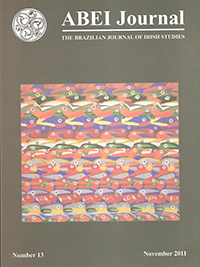Yeats, Beckett, Banville: Philosophical Idealism and Political Ideology in Modern Irish Writing
DOI:
https://doi.org/10.37389/abei.v13i0.3628Keywords:
W.B. Yeats, Samuel Beckett, John Banville, Politics, PhilosophyAbstract
The philosophical nature of elements of Irish writing has been often
remarked upon; the peculiarity of this phenomenon less so. In this article, the relation between idealist philosophy and the politics of writing in the work of W.B. Yeats, Samuel Beckett and John Banville is explored. Obliquely discernible only within certain strands of modern Irish literature, a philosophical obsessiveness has nonetheless developed in a culture devoid of significant philosophical achievement. Thomas Duddy’s A History of Irish Thought is remarkable for making apparent the poverty of Irish philosophical traditions; the invisibility of philosophy in contemporary Irish cultural discourse is also notable by its absence in the recent Cambridge Companion to Modern Irish Culture, for example. Nevertheless, there exists a strong philosophically idealist tradition within Irish literature. This article traces that tradition within
twentieth-century Irish writing, and examines how its ideological character may be considered as complicating the reception of Ireland in the work of these writers.


